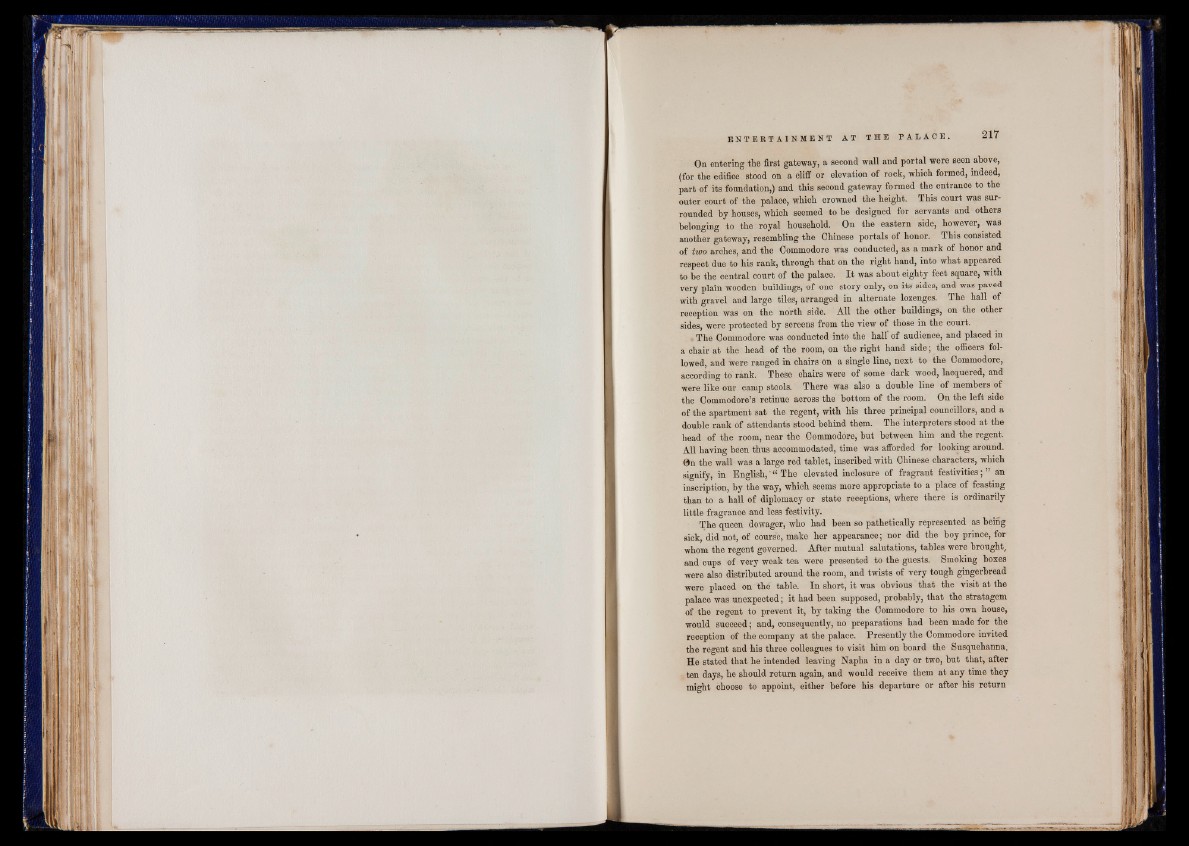
I l i l
On entering the first gateway, a second wall and portal were seen above,
(for the edifice stood on a cliff or elevation of rock, which formed, indeed,
part of ita foundation,) and this second gateway formed the entrance to the
outer court of the palace, which crowned the height. This court was surrounded
by houses, which seemed to he designed for servants and others
belonging to the royal household. On the eastern side, however, was
another gateway, resembling the Chinese portals of honor. This consisted
of two arches, and the Commodore was conducted, as a mark of honor and
respect due to his rank, through that on the right hand, into what appeared
to he the central court of the palace. I t was about eighty feet square, with
very plain wooden buildings, of one story only, on its sides, and was paved
with gravel and large tiles, arranged in alternate lozenges. The hall of
reception was on the north side. All the other buildings, on the other
sides, were protected by screens from the view of those in the court.
, The Commodore was conducted into the hall of audience, and placed in
a chair at the head of the room, on the right hand side; the officers followed,
and were ranged in chairs on a single line, next to the Commodore,
according to rank. These chairs were of some dark wood, lacquered, and
were like our camp stools. There was also a double line of members of
the Commodore’s retinue across the bottom of the room. On the left side
of the apartment sat the regent, with his three principal councillors, and a
double rank of attendants stood behind them. The interpreters stood at the
head of the room, near the Commodore, but between him and the regent.
All having been thus accommodated, time was afforded for looking around.
On the wall was a large red tablet, inscribed with Chinese characters, which
signify, in English,' “ The elevated inclosure of fragrant festivities; ” an
inscription, by the way, which seems more appropriate to a place of feasting
than to a hall of diplomacy or state receptions, where there is ordinarily
little fragrance and less festivity.
The queen dowager, who had been so pathetically represented as being
sick, did not, of course, make her appearance; nor did the boy prince, for
whom the regent governed. After mutual salutations, tables were brought,
and cups of very weak tea were presented to the guests. Smoking boxes
were also distributed around the room, and twists of very tough gingerbread
were placed on the table. In short, it was obvious that the visit at the
palace was unexpected; it had been supposed, probably, that the stratagem
of the regent to prevent it, by taking the Commodore to his own house,
would succeed; and, consequently, no preparations had been made for the
reception of the company at the palace. Presently the Commodore invited
the regent and his three colleagues to visit him on board the Susquehanna.
He stated that he intended leaving Napha in a day or two, but that, after
ten days, he should return again, and would receive them at any time they
might choose to appoint, either before his departure or after his return